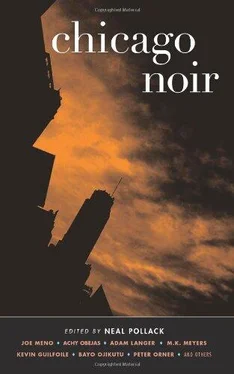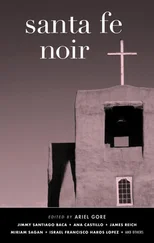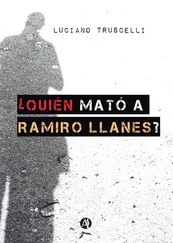Luciano Guerriero - Chicago Noir
Здесь есть возможность читать онлайн «Luciano Guerriero - Chicago Noir» весь текст электронной книги совершенно бесплатно (целиком полную версию без сокращений). В некоторых случаях можно слушать аудио, скачать через торрент в формате fb2 и присутствует краткое содержание. Город: New York, Год выпуска: 2005, ISBN: 2005, Издательство: Akashic Books, Жанр: Детектив, на английском языке. Описание произведения, (предисловие) а так же отзывы посетителей доступны на портале библиотеки ЛибКат.
- Название:Chicago Noir
- Автор:
- Издательство:Akashic Books
- Жанр:
- Год:2005
- Город:New York
- ISBN:978-1888451894
- Рейтинг книги:3 / 5. Голосов: 1
-
Избранное:Добавить в избранное
- Отзывы:
-
Ваша оценка:
- 60
- 1
- 2
- 3
- 4
- 5
Chicago Noir: краткое содержание, описание и аннотация
Предлагаем к чтению аннотацию, описание, краткое содержание или предисловие (зависит от того, что написал сам автор книги «Chicago Noir»). Если вы не нашли необходимую информацию о книге — напишите в комментариях, мы постараемся отыскать её.
Chicago Noir
Chicago Noir — читать онлайн бесплатно полную книгу (весь текст) целиком
Ниже представлен текст книги, разбитый по страницам. Система сохранения места последней прочитанной страницы, позволяет с удобством читать онлайн бесплатно книгу «Chicago Noir», без необходимости каждый раз заново искать на чём Вы остановились. Поставьте закладку, и сможете в любой момент перейти на страницу, на которой закончили чтение.
Интервал:
Закладка:
Inside the house on Whipple Street, when Mom still wasn’t home from work, and Hallie read Agatha Christie mysteries while my grandfather slept, I’d wonder when the burglars would hit our house. It was full of antiques and my late grandmother’s jewels. It seemed as if it would only be a matter of time. Who would put up a fight? My grandfather needed help getting in and out of the bathroom. Hallie was sixty-three. My only hope was that the burglars would wait until Mom and I moved into our own place again. I had never liked Mom’s Jim much. When he was out late drinking at Alibi’s, I’d imagine that he was in my bedroom staring down at me. But whenever I turned on the nightlight, no one would be there. Now I wished he would come back.
Mr. Klein’s tales of burglaries didn’t impress Jason Rubinstein. He and his uncle, Bobby Kagan, had just moved to Albion Street from Albany Park, where, to hear Jason tell it, the streets were becoming overrun with Korean gangs; every night he fell asleep to the sounds of gunfire.
Jason and I met at Beginners Woodshop at the JCC. Though he and I were in the same grade, he was a year and a half older, more than six inches taller, and probably fifty pounds heavier than me. He claimed to have fingered Robyn Rosen in the nocturnal mammal house at Lincoln Park Zoo and to have lit off firecrackers during the Elton John show at the Chicago Stadium. If you jammed your thumbs into someone’s temples, he said, their heart would stop.
When the JCC canceled Woodshop due to overall lack of interest, Jason and I took the opportunity to start walking our bikes alongside the Chicago River drainage canal on the rubble-strewn site of the old Kiddieland amusement park. Jason showed me what a used condom looked like. He also pointed out an empty Ziploc bag, which he said had probably contained marijuana. Sometimes we’d bike past the Lincoln Avenue motels.
“That’s where the hookers take their johns,” Jason said.
I nodded, needing but not asking for further explanation.
Jason said he’d learned everything he knew from his uncle, Bobby Kagan. Bobby was slim, with a full head of black curls. He walked with his shoulders hunched forward, his hands dangling down in front of him. He wore bracelets, necklaces, and pastel shirts opened at least three buttons. Before he started speaking, something he always did quickly and breathlessly, he’d swipe an index finger across his nostrils, blink his eyes, and swallow hard. He said he worked for the White Sox, but I figured he was lying. One time, he said he was in charge of concessions. Another time he was a scout. Once he said he’d done color commentary for the Sox farm team, the Iowa Oaks.
Still, he managed to get good seats for Jason and me. And not only for Sox games. During the first half of that summer, we saw the Sox three times at Comiskey Park and sat on the third base side during Bat Day. We also got to sit behind the visitors’ dugout for Cubs games at Wrigley Field. Bobby Kagan always drove us to and from the games in his red Cadillac DeVille with whitewall tires. He’d buy our Cokes and hot dogs with one of the hundred-dollar bills that he peeled off a roll he kept in his right front pocket. But he’d leave before batting practice and wouldn’t return until the ninth inning, when he’d say he’d met an old friend or had some business to take care of. Whenever I spoke, he’d cut me off. I sensed that he never listened to what I was saying.
One night, though, in Bobby’s car, after the White Sox had taken a twi-night doubleheader from the Twins, I said that I was glad we were coming home late because Mr. Klein had told me that the burglars had never struck after 10:00. And for the first time that I could recall, Bobby seemed genuinely interested. What robberies, he wanted to know, what had they taken, who had told me all this, who was this Mr. Klein, what did he do for a living, and which house was his?
I told him what I knew about the robberies. The most recent one had taken place at a retired policeman’s house on Tripp. They had taken his collections of clocks and belt buckles, as well as his framed Colt .45s. Bobby Kagan seemed impressed with my attention to detail.
“You oughta be a cop,” he kept saying.
On this drive from 35th and Shields all the way north to West Rogers Park, I felt more comfortable than I had ever been with Bobby Kagan, and the most comfortable I would ever feel. Before the drive, I don’t recall him ever looking me in the eye. Not long afterward, he started dating my mother.
During the second week of July, the night of my thirteenth birthday party — we had played.500 and had a picnic in Warren Park — Jason and I slept in sleeping bags on the floor of Shelah’s room. The following morning, when we came downstairs, Bobby was in the kitchen with my mother. He opened the refrigerator and pulled out a carton of half-and-half. Two days later, mom handed me a five-dollar bill and told me to buy dinner for myself from Brown’s Chicken because “Bob” was taking her to the Sox game. I started to protest.
“What?” she said. “You think you’re the only one in this house allowed to have fun?”
Jason and I were sharing the five-piece chicken dinner in Chippewa Park when we saw two squad cars speeding west on Touhy. Their blue lights were going, but their sirens were off, which meant, Jason said, that they were trying to break up a crime in progress. Before finishing our drumsticks, we were back on our bikes, following the cops to Maplewood Avenue, where four squad cars had double-parked in front of a bungalow. A white-haired lady in a housedress and slippers was standing on her lawn, while police officers walked toward her with flashlights in their right hands, left hands poised over their holsters. As Jason and I leaned against our bikes and watched, one of the cops asked what we were looking at. Jason just stared straight back at the cop.
“I ain’t looking at nothin’,” he said.
When we got to Mr. Klein’s house, Klein inexplicably already knew more than we did; he said he’d heard the news over his police radio. The victim was Mrs. Ruttu. They’d gotten her TV and her hi-fi. The most “brazen” aspect of the crime was that the burglars had taken everything while Mrs. Ruttu slept in her front room, and Klein now had theories about the culprits.
“Probably Arabs or Mexicans,” he said. “Someone new to the neighborhood.”
I listened intently, but Jason kept sniggering as if he doubted either the facts or Mr. Klein’s sanity. Whenever Jason laughed, Mr. Klein would stop for a moment, stare sternly at Jason, then continue. But when Mr. Klein said it was a wonder poor Mrs. Ruttu hadn’t died of a heart attack and Jason laughed again, Mr. Klein stood up and said he’d tell me the rest of the story when my friend had gone home.
“Fran,” he shouted to his wife, as he opened his screen door, “I’m comin’ in!” And then he slammed the door.
I told Jason it didn’t seem right to laugh about a woman nearly having a heart attack, but he told me he wasn’t laughing at that. He was just laughing at the idea of somebody sleeping while someone else carted off a TV. Burglaries didn’t happen like that. Half of the time when thefts were reported and there was no sign of forced entry, it meant that the victim knew the robber and had planned the crime, hoping to collect insurance. That’s what Bobby had told him, anyway.
“How does he know so much about it?” I asked.
“Bobby knows everything,” he said.
In early August, armed with information provided by Mr. Klein, Jason and I sat down at a back table of the Nortown Library with a Xeroxed map of West Rogers Park, and plotted the robberies, searching for an overall pattern in the dates and times when they had happened, but found nothing. The robberies had taken place during mornings and evenings, in houses and apartments, on Tuesdays, on Thursdays, on weekends. They’d happened on Farwell, on Fairfield, on Granville, Bell, and Washtenaw. Not on Whipple Street, though, Mr. Klein was always quick to point out.
Читать дальшеИнтервал:
Закладка:
Похожие книги на «Chicago Noir»
Представляем Вашему вниманию похожие книги на «Chicago Noir» списком для выбора. Мы отобрали схожую по названию и смыслу литературу в надежде предоставить читателям больше вариантов отыскать новые, интересные, ещё непрочитанные произведения.
Обсуждение, отзывы о книге «Chicago Noir» и просто собственные мнения читателей. Оставьте ваши комментарии, напишите, что Вы думаете о произведении, его смысле или главных героях. Укажите что конкретно понравилось, а что нет, и почему Вы так считаете.












